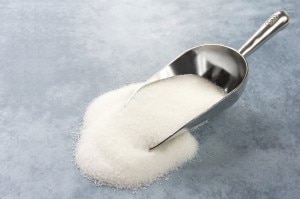For those who are trying to cut back on sugar, there are various sugar-free alternatives available to satisfy your sweet tooth. But are they safe? Read on to find out more about four common sugar substitutes.
1. Aspartame
Aspartame is a popular food additive that has generated a great deal of controversy. Some claim that certain amino acids (aspartate and glutamate) in aspartame may overstimulate and damage your brain’s neurons. However, conclusive research is limited.
Certain individuals should avoid aspartame, including those with phenylketonuria (a genetic disorder) and advanced liver disease, as well as pregnant women, because their bodies cannot metabolize phenylalanine, a compound found in aspartame. Others may experience aspartame sensitivity, which can trigger headaches, dizziness and nausea.
2. Sucralose
Delivering up to six times the sweetness of sugar with no calories, sucralose is made from sugar molecules, although it’s not “natural.” Sucralose is actually the result of several chemical modifications that prevent your body from metabolizing the substance, keeping the caloric content at zero.
Although the long-term effects of sucralose consumption in humans is still unknown, several short-term effects have been observed in rats, including a reduction in beneficial gut bacteria, as well as a possible decrease in the absorption and effectiveness of medication.
3. Stevia
Stevia is a plant species native to South and Central America. This naturally sweet plant has been widely popular in Japan since the 1970s, where it is used in food products and soft drinks.
Unlike sugar, stevia has no effect on blood glucose levels, has no calories and does not promote fat storage within the body. Stevia products can be bitter, so it might take some experimenting to achieve the right flavor.
4. Xylitol
Xylitol is a sugar alcohol that provides a taste and texture similar to sugar, with approximately 40 percent fewer calories. It is commonly used in sugar-free gums and candies to promote oral health, due to its potential ability to reduce the prevalence of cavity-causing bacteria within the mouth.
Xylitol can be used to sweeten beverages, baked goods and other foods. Be advised, however, that xylitol may cause gastrointestinal upset in some individuals and is extremely toxic to dogs, even in small amounts.

